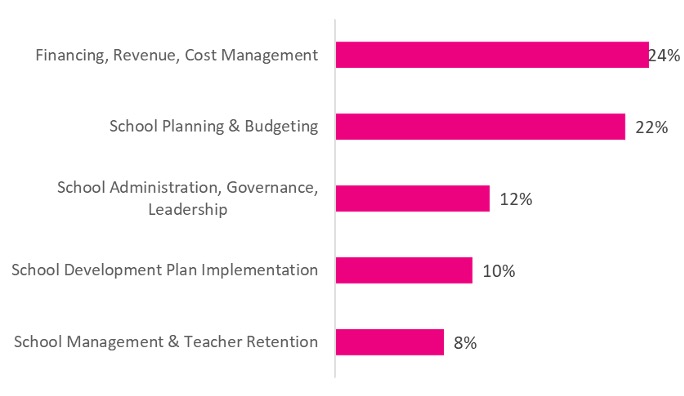Graduate research evaluates education links to labor market & learning outcomes

Learning Partnership: Munk School of Global Affairs, University of Toronto
It is well known that over half of children and adolescents worldwide are not learning (UNESCO 2017). As part of our commitment to stay on top of the latest education research, EduFinance has collaborated with two groups of graduate students completing their Masters in Global Affairs (MGA) at the Munk School of Global Affairs, University of Toronto. The students applied their research and analysis skills to contribute to two areas of learning that EduFinance was seeking to further investigate, in line with our Monitoring and Evaluation (M&E) strategy.
Opportunity EduFinance’s multi-year Monitoring and Evaluation (M&E) strategy is focused on three key pillars:
- Demonstrating the impact of EduFinance
- EduFinance program optimization
- Adding to the public body of knowledge
Each cohort of students was given research topics to consolidate academic and practitioner research that would help EduFinance continue aligning program elements with areas of greatest impact, and that could help add to the public body of knowledge in a concise format (EduFinance M&E Pillars #2 & #3).
Two key objectives were identified for the studies to be conducted by the graduate students:
- Labor market outcomes: To develop recommendations and answers to the quantifiable benefits of increased access to education for students in low- and middle-income markets and identify what is preventing children from accessing decent work opportunities when they transition to the labor market.
- Learning outcomes: To develop recommendations for the most effective ways to drive and measure improvements in learning outcomes for children.
Research Findings & Recommendations
Report: Labor Market Outcomes
The Labor Market Outcomes report highlights the importance of participation in education (access), quality of education, and capacity of education systems (human capital) as the supply-side factors that determine the extent to which education leads to employment. Access to quality education within the framework of a strong education system is the foundation on which children to build employable skills and increase their earnings potential. Increased earnings potential can help alleviate poverty for both current and future generations.
“Education has the power to reduce poverty and transform people’s lives. However, the benefits of education depend, in part, on the link between education and employment…. As EduFinance works to address the global education crisis, it is imperative to consider how investments in education can be used to maximize labor market outcomes.” – Executive Summary, Labor Market Outcomes Report
Through School Fee Loans and Tertiary Tuition Loans ensuring children and youth can continue their education, Opportunity EduFinance bolsters the future supply of human capital for labor markets. An EduFinance key insights piece recently published highlights the impact these school fee loans are projected to have on children’s future earnings.
Optimizing EduFinance Program Impact
Three key take-aways were identified which are informing EduFinance’s strategic planning and focus in key target areas.
- Facilitating access to quality education in the earliest years of a child’s school career should remain a priority for EduFinance, and holistic early childhood interventions should also be considered. The first figure below highlights the scale of the challenge for many regions worldwide.
- Curricular reforms towards more competency-based and learner-centred models that allow students to develop a well-rounded skillset should be encouraged and aligned with current and future market demands
- Tertiary and Vocational Education Training (TVET) programs propose a unique investment opportunity to help overcome issues of skills mismatching and should be tailored to address region-specific talent shortages.
Pre-primary gross enrollment rates remain worrying low in low and middle-income markets

EduFinance agrees that investment in quality improvements around early years skill development is foundational to the pathway to future employment. EduQuality, a program of Opportunity EduFinance, is continuing to expand professional development training for instructional leaders and teachers that aims to strengthen education delivery from early years through primary age, when essential foundational skills are first developed. EduQuality also emphasizes a learner-centered approach to teaching and learning, sharing practical skills with educators on how to shift from teacher-focused to learner-focused lessons.
Additionally, EduFinance has recently conducted TVET market research and is working with several financial institution partners to provide TVET loan products for both students and TVET institutions. These products strategically target industries with accessible employment opportunities in the local labor market.
Report: Learning Outcomes
The report on Learning Outcomes highlighted training and interventions that drive the most improvements in quality, including School Leadership Professional Development training, Teacher Training and access to ICT.
“…if the education sector maintains its current trajectory, by 2030 half of all children and youth will lack the basic secondary-level skills needed to succeed.... This calls for increased attention, resources, and solutions to better education systems. In particular, this can be achieved by focusing on how to drive the most effective and efficient improvements in learning outcomes.”– Executive Summary, Learning Outcomes Report
Optimizing EduFinance Program Impact
A key take-away of the report was that investment in school leadership professional development can have a significant impact on learning outcomes. The EduQuality program offers school leaders several 2-day workshops each year focused on areas most relevant operating a low-fee private school. Based on participant surveys after each workshop in 2019, training modules on financing, revenue and cost management, as well as school planning and budgeting, were identified as the ‘most useful’ to leaders.

EduQuality continues to optimize the program using feedback loops from multiple stakeholders. Currently the program team is developing additional school leadership professional development modules that offer more in-depth training in school and financial management topics, identified as a priority by leaders.
Improved business and financial management also builds a school owner’s ability to successfully access additional capital through local financial institutions that offer school improvement loans. Access to school improvement loans can play a key role in financing new ICT at a school, such as setting up a computer lab or purchasing computers for teacher use in the classroom. The report also pointed to studies which have demonstrated that access to ICT is beneficial to overall learning outcomes.
Similar to school leadership and professional development, the report found investments in teacher training have a direct correlation to improved learning outcomes. EduQuality is currently strengthening the program’s teacher mentor training, focusing on an effective model that enables schools to institutionalize an ongoing process of teacher professional development, observation and feedback, and coaching. This is especially important in low-fee schools that often have higher rates of teacher turnover and need to frequently onboard and train new educators. The model combines digital and in-person training, with a focus on modeling and practicing practical pedagogical skills during training sessions.
Conclusion
Research partnerships and reports like these are one way that EduFinance is looking to increase the knowledge and awareness of the impact that our core investments are having on learnings outcomes and the future employability of children who benefit from the program.
EduFinance is grateful to the the following graduate student teams who focused their efforts on these important research topics from the Munk School of Global Affairs, University of Toronto:
Learning Outcomes Report: Tea Cimini, Justin Raposo, Bushra Rahman, Shaquille Morgan, overseen by Professor Rajshri (Raji) Jayaraman.
Labor Market Outcomes Report: Shlomit Broder, Madeleine Foley, Rachel Pagdin, Mackenzie Rice, Michelle Verbeek, Sorena Zahiri, overseen by Professor Rajshri (Raji) Jayaraman.
The full reports can be found here on the Opportunity EduFinance website.